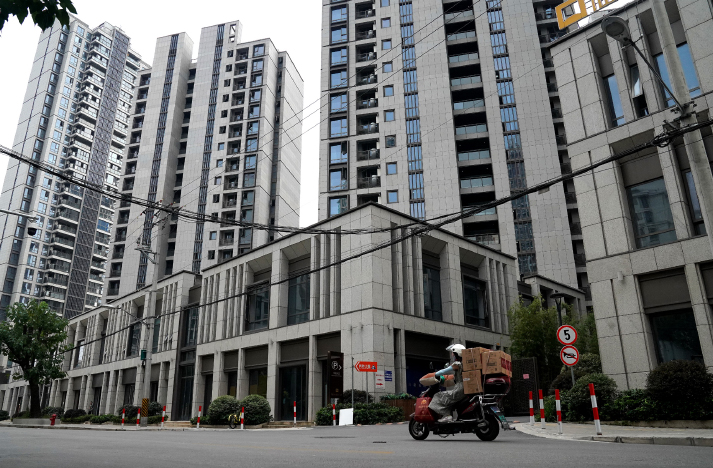| Business |
| Housing Market Adopts New Methods Amid Epidemic | |
| Virtual reality technologies are wooing the real estate sector in China | |
|
|
 Commercial residential buildings for sale in Shanghai on August 16, 2019 (XINHUA)
Beyond zoos, museums and games, virtual reality (VR) technologies are wooing a more unexpected sector in China: the real estate industry, which is using it to keep itself afloat during the novel coronavirus outbreak. VR salesrooms and livestreams are gaining popularity among property developers and agents to pitch their projects to potential house buyers. The proportion of online VR house visitors surged 57.7 percent month on month in January, according to online marketplace 58.com and housing information platform Anjuke.com. Data from another online housing platform Beike showed that over 1.24 million VR visits were made between February 1-9, skyrocketing almost 60 times year on year. On February 17, official data showed that home prices in 70 major Chinese cities remained generally stable in January, with 47 reporting month-on-month gains, down from 50 registered in December 2019. Yet the bite of the epidemic is likely to be reflected in February's housing investment and sales data as prevention and control measures escalated. Many cities have suspended offline house sales activities, as well as the construction of apartments, weighing on the capital-intensive sector's operation. Despite increasing downward economic pressure, the authorities have kept a tight lid on housing market speculation. The country will stick to the principle of "housing is for living in, not for speculation," along with the implementation of a long-term management mechanism for the market, said Finance Minister Liu Kun in a written article published in a recent edition of Qiushi Journal, a flagship magazine of the Communist Party of China Central Committee. While avoiding large-scale stimulus, some local governments have stepped in to help the sector during this tough time. Cities such as Xiamen and Fuzhou in the southeastern province of Fujian have unveiled a string of incentives including credit support, financing cost cuts and repayment expiration extensions to ease the property market strain. Some developers also took to price-cutting to lure customers. On February 16, China Evergrande Group, the third largest developer in the country, said it would offer a 25-percent discount on all property sales from February 18 to 29. Zhang Bo, a researcher with 58.com, said he is upbeat about the market's long-term growth. "The outbreak may exert short-term downward pressure on the property market's turnover, though once the outbreak ends, in general, the housing market will recover and sales will see a rebound." "The current property industry plays a different role in the Chinese economy and operates in a different economic climate than in 2003 when severe acute respiratory syndrome broke out, with various new characteristics and development trends," Sheng Songcheng, a senior researcher and former central bank official, said in a research note. Sheng suggested local governments fine-tune their real estate market policies with reasonable and targeted support for the sector, while "overall market stimulus for short-term growth is not an advisable choice." This is an edited version of an article published by Xinhua News Agency Copyedited by Rebeca Toledo Comments to linan@bjreview.com |
|
||||||||||||||||||||||||||||
|